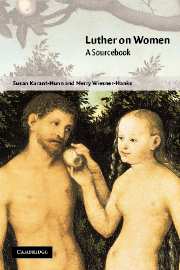7 - Childbirth
Published online by Cambridge University Press: 05 June 2012
Summary
Bearing children was to Luther's mind women's paramount function. Without the creation of Eve, humankind would have died out with Adam. There was at the outset no human counterpart to the female of every other species, with which the bucks, boars, bulls, and billy goats were able to reproduce their kind. Eve had other salient duties, such as to assist Adam in all his tasks and to be his companion. In these he could theoretically have been aided by another man. But only with a woman could he “be fruitful and multiply and replenish the earth.”
Luther does not reveal conclusively whether he thought Adam and Eve actually had progeny before the Fall. We are not told how much time elapsed between the creation of Eve and her seduction by the serpent. Luther thought that without the Fall mating would have taken place without “evil lust” but rather calmly, matter-of-factly, without shame or self-consciousness. People would have had many more offspring than the one that women now ordinarily bore at a time, and mothers would have experienced none of the common maladies of pregnancy, parturition, nursing, or babyhood. God had added all the travails of reproduction and child-tending to women's lot when Eve disobeyed.
In addition to remembering what Luther said about bearing children in a narrow sense, we must also consider his teaching on “vocation.”
- Type
- Chapter
- Information
- Luther on WomenA Sourcebook, pp. 171 - 185Publisher: Cambridge University PressPrint publication year: 2003

